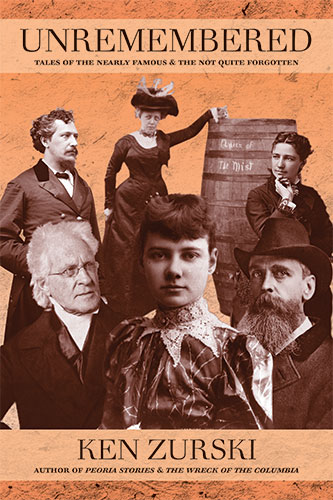A longtime radio broadcaster and native of Chicagoland, Ken Zurski is a familiar voice to many Peorians as traffic reporter for 1470 WMBD-AM. Over the last six years, he’s also proven himself to be a remarkable historian, storyteller and writer. Zurski’s first book, 2012’s The Wreck of the Columbia, continues to hold local attention with the centennial anniversary of the tragic steamboat excursion on the Illinois River. Two years later, his follow-up, Peoria Stories: Tales from the Illinois Heartland, collected accounts of area visits from the likes of Charles Lindbergh, Abraham Lincoln and Theodore Roosevelt, describing their impact on the Peoria region.
Zurski’s third and latest book, Unremembered: Tales of the Nearly Famous & the Not Quite Forgotten, expands the scope of his subject matter, drawing on material from his regularly updated blog at unrememberedhistory.com. “I’ve always been fascinated by these lesser-known personalities, the so-called ‘other’ people, or obscure figures whose contributions to our past have been disregarded, neglected or simply put out of mind,” he explains. “These are the stories I want to tell. The stories of the unremembered.” iBi asked Zurski to reflect on the new book, the challenges of writing about history, and what’s next for him as an author.
What thread connects the stories in your new book?
There are four parts to the book, each with varying subjects, but with an underlying theme of travel and transportation. In the mid-19th century, there seemed to be a general desire and an almost-obsessive quest for some to find the most efficient and quickest way to get from one place to the other. Of course, advancement in an industry and modern engine improvements helped, but beyond convenience and speed, people just wanted to witness and touch some of things they were reading about or seeing in representations. This was especially true for the natural wonders of the west, like Yellowstone and the Grand Canyon, which were unreachable to most Americans.
How did you determine which stories to pursue further? Were there any that didn't make the cut?
The book is based on unrememberedhistory.com, my blog site which I started nearly three years ago after Peoria Stories came out. I had written over a hundred short stories of people and events that were “famously interesting, mostly forgotten,” but I didn’t want the book to be a series of articles, so I choose a few I had already covered and used that as a springboard to connect subjects and themes within a framework of a flowing narrative. Most of the people in the book, however, branched out from only a select group of stories found on the blog, so they are new, even to my online readers.
Your other two books were locally-focused. Does the Peoria area show up in this book?
Yes. One of the worst train wrecks in the U.S. by loss of life happened in Illinois just east of Bloomington in Chatsworth. Most of the people on board were from Peoria. It’s another tragic and fascinating story like the Columbia disaster. So just after The Wreck of the Columbia came out, I did some research on the Chatsworth train wreck in hopes of maybe doing a treatise like I did with the steamboat. That never came to be, but I was at a place in this book where I knew the story of the train wreck fit. Basically, it was about where the train was headed.
What was your biggest challenge in putting this book together?
Finding the right concept and tone was my biggest challenge. I wanted to tell these stories in an entertaining way, and yet not trivialize these figures or what they did. Because they are unremembered doesn’t mean they weren’t important once. In some cases, these are people who were just as famous in their time as, say, Lincoln or Lindbergh were. Why they are mostly forgotten today is a part of the overall concept of the book.
What's next for you as an author/historian?
That’s always a hard question to answer, especially for someone who writes about history. My plan is to make Unremembered a series, since there are so many stories to tell and areas to cover. But an independent author’s next move is always based on how well his last book does, so I’m hoping for the best with this one. I have lots of ideas, though.
Anything else you'd like to add?
“Keep history alive” is a tagline I like to use a lot. I mention this to groups when I talk about the Columbia. I tell them to always remember or write down stories passed on by their ancestors, even if it’s from generations ago. The story of the Columbia is a good example. The heart of that tale is told through the stories of the people who survived it. We can always recreate a story that happened a hundred or so years ago, but we can’t tell it better than those who were there. So it’s important to keep the past alive for generations to discover and explore. iBi


